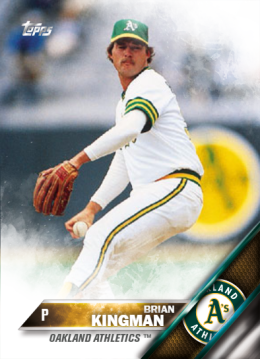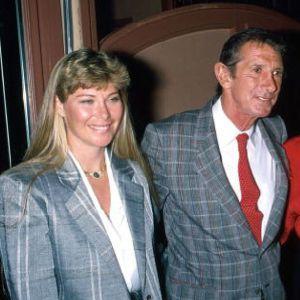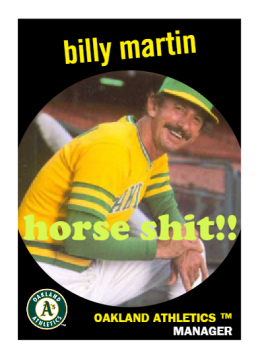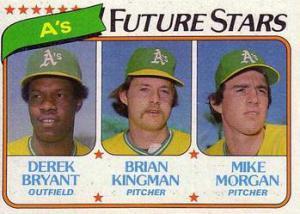 CCA: On page 209 of Nancy Finley’s new book “Finley Ball,” she writes that manager Billy Martin started dating Jill, who he eventually married. (She also was called “the devil” by his children from another marriage by refusing to give them any memorabilia and selling it all after Martin’s death.) Is it true that she was dating a player who asked you “how do you complain to the manager who is hitting on your girlfriend?” Are you comfortable naming this player?
CCA: On page 209 of Nancy Finley’s new book “Finley Ball,” she writes that manager Billy Martin started dating Jill, who he eventually married. (She also was called “the devil” by his children from another marriage by refusing to give them any memorabilia and selling it all after Martin’s death.) Is it true that she was dating a player who asked you “how do you complain to the manager who is hitting on your girlfriend?” Are you comfortable naming this player?
REVISITING 1980 – BILLY MARTIN’S DOG HOUSE & SOAP OPERA
“Billy first laid eyes on Jill Guiver in 1980 before a game against the California Angels. She had a camera on her shoulder. Though she didn’t work for any organization, she was telling everyone she was a free-lance photographer. At one time she had dated one of the Yankee players, Reggie Jackson. According to ball players who knew her at the time, her photography was her way to get to meet them. The way she looked, an introduction was all she needed. She liked to wear tight-fitting clothes and short shorts. She was very sexy. Jill asked Billy if she could take his picture. Billy asked her if he could take her for a drink after the game. They began dating, which threw a scare into at least four of Billy’s players who were also seeing her. These players feared that she would reveal to Billy that they were also going with her and that Billy would take it out on them. They were praying that Billy’s relationship with Jill Guiver would soon end, that she was only a phase, in part because they feared Billy’s wrath and also because as long as Billy was with her, they couldn’t be.” ~ Wild, High and Tight: The Life and Death of Billy Martin

BK:I don’t know if it was the day Billy met Jill, but it had to be close to it. All the players had noticed an attractive woman with a camera near our dugout during batting practice. Billy spent an abnormally long amount of time in the clubhouse during the game that day. This was extremely rare. Billy was always watching the game from the dugout. I wasn’t pitching on this day and happened to be in the clubhouse when I saw Billy emerge from the manager’s office with Jill. Most of the players had noticed Billy’s unusually long absence from the dugout,and a few knew that Billy was interested in the “girl with the camera”. I don’t think any of them knew he was alone with her in the manager’s office during the game.
Well I don’t know about four players on our team dating her, but I had heard of one that was. During the game I mentioned to him that I had seen Jill in Billy’s office. His response was “How do you complain to the manager who is hitting on your girlfriend?” Maybe he was just wondering what those other guys mentioned in Wild High & Tight were going to do about it?
CCA: There was also an instance mentioned in the same book where Martin tells you to walk a guy and the guy reaches out and slaps a single on pitch that was meant to be ball and Martin apparently charged out of the dugout screaming, “you motherfucker…I told you to walk him!”
BK:There were actually two games where Billy really surprised me with the way he handled things. The first one is the one you asked about, where Billy came out of the dugout yelling at me. It was against the Cleveland Indians. The second game was about two months later against the Toronto Blue Jays. Both are described below:
THIS IS THE HORSESHIT MOTHERFUCKER GAME AGAINST THE INDIANS (MAY 7, 1980)
On May 7, 1980 I pitched a game against the Cleveland Indians in Oakland. It was a day game and there were maybe 5,000 fans in attendance. I didn’t give up a hit until the 5th inning, but in the 6th I gave up two hits and when Mike Hargrove came to the plate, Billy Martin came to the mound.Billy told me to throw Hargrove four straight pitches high and away. “Maybe we can get him to pop up”. The first two pitches were shoulder-high and a foot outside. The next pitch was a little higher, but maybe only 9 or 10 inches off the plate. Hargrove managed get a hit and Billy came out of the dugout screaming obscenities (“You horse shit motherfucker”) at me. With such a small crowd his voice carried, and could be heard throughout the stadium.
My catcher Jim Essian couldn’t believe that we didn’t just walk Hargrove. Which is the same thing Hargrove told our first baseman.
I didn’t pitch again for two weeks!

It turns out Hargrove knew that Billy had told me to throw him high fastballs up and away. He said he had seen it before several times when Billy was his manager in Texas.
THE STUPID PITCHER GAME: JULY 21,1980
In the game above, against the Indians, Billy had called me a horseshit motherfucker. In this game, about two months later, I apparently had progressed enough to just being called stupid, which some may see as an upgrade from horseshit motherfucker.
Toronto Blue Jays 1 Oakland Athletics 0
Pitching IP H R ER BB SO HR ERA
Brian Kingman, L (5-10) 9 9 1 1 2 8 1 3.41
Billy was a great manager. He knew the game, and all of its nuances, inside out. If he had a weakness as a manager it was in how he treated players. He was especially hard on pitchers, especially LOSING pitchers. The last straw for me was in a game he insisted I throw a fastball to a hitter (Alvis Woods) who hit a home run. I threw a complete game and lost 1-0. When the reporters came up to me after the game, they told me that Billy said I was a stupid pitcher because I threw a fastball hitter a fastball behind in the count. My reply to the reporters was: ‘How stupid can I be if Billy is the one who called the pitch? The next day the headline in the sports section was:
KINGMAN RIPS MARTIN
Well, that might not have been the best thing for my career. The old proverb “The truth shall set you free, suddenly turned into “It may be the truth, but the truth shall make Billy mad” I had no idea that would be the headline! I realize that reporters have to make a living, and headlines sell papers, but after this happened, I knew Billy hated me. He was a very small man in that way – holding grudges, always looking for revenge for things real and imagined.
CCA:Nancy also talks a bit about how you were going to get married but Billy Martin was dead set against it. You lost 9 in a row after the marriage. What was going on there?
Was it a psychological issue? Rebellion?
BK:The short answer is that It wasn’t a rebellion. It was just the cumulative effect of a very toxic situation. The combination of poor run support combined with a manager who unless you were winning, was one of the hardest managers to pitch for. Instead of looking forward to my next start, I began to dread it. For the long answer read on:
The games above preceded my 9 game losing streak. Before the losing streak my record was 7-11 and my ERA was 3.41. I easily could have been 11-7, except for the fact that I was getting less than 3 runs a game in offensive support.
The 2.50 runs per game the A’s scored in my 20 losses are deceptive because 11 of the 50 runs scored were in one game.
If you take out those 11 runs and that one game, I got a whopping 2.05 runs per game in my other 19 losses. If I had been 11-7 with a 3.41 ERA I believe I Billy would have found someone else to pick on. Everyone is happy when they are winning. Losing was like a small piece of death for Billy,and I was losing at an alarming rate.
In order to get married I was going to have to miss a game. I told Art Fowler about my plans and he said “You’d better ask Billy, he usually doesn’t like guys getting married during the season because it’s a distraction” I told Art that I would ask Billy, but I was thinking there could be no bigger distraction for me than Billy. My first goal when I stepped on the mound was to win the game. My second goal, unfortunately had become to avoid incurring Billy’s wrath.
Billy “granted” me permission to miss a game and get married. When I returned I threw 3 straight complete games, but lost all three by the scores of 3 -2, 4 -3 & 4 -2. I pitched well in those games. I think my era was around 3.5, yet my record now stood at 7-14. The main reason I was losing once again was a lack of offensive support. One of the most devastating factors to a pitchers won-loss record is a lack of offensive support. It the difference between winning 5-4 instead of losing 3-2.
“As for Kingman’s run support, it was literally historically bad. I’ve gone through the game logs at retrosheet & figured out the run support (adjusted for park & league)for 1096 different seasons in which a pitcher started at least 25 games. Kingman’s 1980 is the 13th worst of that bunch. His run support was only 68% of league average when adjusted for park & league.”

In the remaining six games of my losing streak, I pitched less effectively than I had up to that point in the season. There is no doubt that the psychological burden of losing was becoming more and more of a factor. Constant, long term losing erodes confidence, which is crucial to success in all sports.The lethal combination of poor offensive support and playing for a manager who hated to lose perhaps more than any manager in baseball history took it’s toll on me. There was an increasingly pervasive sense of futility that you think you can overcome by being mentally tough, and to a certain degree you can. However it is still a burden, an additional obstacle, for which the only remedy is to win. It felt like I was the only one losing, since all the other starters were winning. After losing nine consecutive games my record stood at 7-20.
“Brian Kingman was a pitcher who was very frustrating to Billy because Billy could see he was probably the most talented of the five of us as far as stuff went. Brian was a very intellectual guy. If Brian and Billy had a problem, it was because Brian would not talk to Billy about things that bothered him or about personal things” ~Matt Keough Wild, High and Tight: The Life and Death of Billy Martin
If you look at the history of 20 game losers you’ll see that virtually all of them were on teams that lost at least 90 games, and quite often 100 games or more. On those teams with 20 game losers almost all the starters have losing records.They say misery loves company, well I was all alone in 1980. In fact the last time a pitcher lost 20 games on a winning team was in 1922. His name
was Dolf Luque. Ironically I was a winning pitcher in 1979 (8-7) with a team that lost 108 games.

